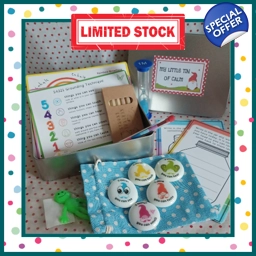
Emotions
Social Emotional Development and Communication Skills
"An important part of child development, emotional skills play a part in laying the foundation for better mental health as children grow." Nurture Gnomes
Social emotional learning (SEL) fosters children's interpersonal skills and helps with developing self-awareness and self-control. These can play a central role in helping children not just educationally, but with personal and lifelong well-being.
The benefits of learning and understanding more about emotions include:
* helping to grow in confidence
* increasing positive behaviours such as kindness, sharing and empathy
* reducing some challenging behaviours
* helping to develop lasting and meaningful friendships
* developing resilience to outside influences
* preventing some mental health issues
* teaching children to value those around them.
All new environments provide children with opportunities for growth and a lot of schools are using programmes to help build on these skills either as whole class activities or small groups. The Nurture Gnomes resources can complement these lessons and can also be used as stand alone lessons or independently (by parents, foster carers or play therapists).
Teaching Children about their Emotions
All children require support in learning how to identify their emotions and ways to cope which supports healthy social and emotional development.
When you normalise emotions (especially the more intense ones) it can help to decrease anxiety and undue stress; found when children are fighting against their feelings. Validating their emotions and letting them know that they are normal can help them feel less overwhelmed, be accepting of them and work through them.
The first step in dealing with emotions is being able to identify them and supporting children to label their feelings (using as wide a vocabulary as possible). They are then the better placed to pinpoint what it is they are feeling.
To support their physiological stress, children need help developing their self-awareness by understanding what calms and composes them, which is the next stage. Placing some visuals around can help them decide what might work when they are feeling a certain emotion. Eg., if they are angry they may need to do push ups against a wall, jump around outside, listen to music or read a book. Every child is different and their reasons for the emotions can be different – so this helps to meet some of their sensory needs too.
When unresolved feelings are not being met can lead to physical symptoms such as tummy aches or headaches, so allowing these feelings is not only far better overall but it also supports their emotional development. As adults, well-meaning statements such as “your toy isn’t broken – stop crying” unfortunately do not work because when children are in a heightened state, the brain literally cannot learn. Children need help in recognising and finding ways to manage their emotions, so when an adult recognises it for them, names it, provides comfort and offers a solution not only teaches emotional regulation, it helps to build trust too.
Validate these feelings instead “I can see that you are upset because your toy looks broken, let’s have a cuddle and see if we can fix it.”
Imagine a stormy seas analogy, when children are in a heightened state of their emotions they are unable to listen to reason due to their 'fight, flight, freeze' response. It is far easier to let these feelings wash over and ease naturally rather than fight against them.
The 'Nurture Gnomes' products have been designed to support children in further increasing not only their social and emotional development but overall well-being, in a fun and relaxed way.
DEVELOPMENTAL AGES AND STAGES
While there are many more, I have highlighted five in each year group of some of the more typical areas of development.
Ages 3-4 years
- uses words to communicate needs
- begins to share toys
- starts to express a wider range of emotions
- not usually able to articulate emotions with words
- can sometimes work out small conflicts with other children.
Ages 5-6 years
- more aware of rules and following them
- more independent
- enjoys co-operative play
- understands others’ feelings and show signs of sensitivity
- may use unkind words to express how they feel about themselves or others.
Ages 7-8 years
- has a greater awareness of their surroundings
- begins to expand vocabulary to include their emotions
- more aware of the perceptions of others
- more likely to complain about their friends and how they react
- tries to express feelings, but may resort to tantrums when upset.
Ages 9-10 years
- affectionate, curious and finds the humour in silly things
- uses problem solving with peers and learns to compromise
- emotions may change quickly
- begins to develop their own identity (and may prefer alone time)
- can express subtle emotions.
Ages 11-15 years
- values the opinions of friends (sometimes more over family)
- may try out a change of speech, clothing as they try to find where they fit in
- has more logical thinking
- moods and emotions are impacted by hormones
- can show empathy.












